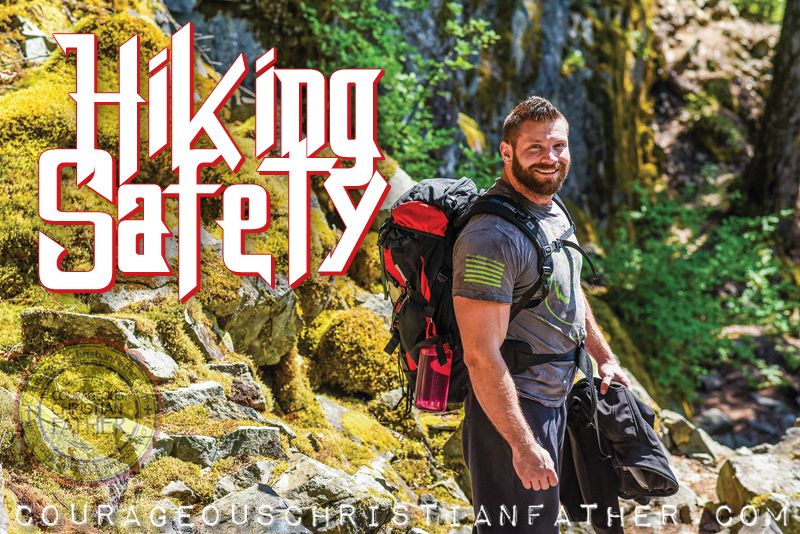Hiking Safety – Hiking can be enjoyed even by novice outdoor enthusiasts, this rewarding activity also can be dangerous. Hikers often find themselves in remote locations where cellular phone signals tend to be weak, which can be troublesome, even when hiking in relatively crowded parks. That’s why it’s important to take the following precautionary measures when hiking.

Hiking Safety
Hiking is a great way to enjoy the great outdoors. It is also a great way to see God’s Creation first hand! But even veteran hikers must take hiking safety precautions to ensure their trips are as safe as they are enjoyable.
National parks are great places for outdoor enthusiasts to enjoy some of their favorite activities. Many such parks allow visitors to camp out after a day spent rafting or kayaking on the water, making these locales the ideal vacation spots for families or groups of friends who share a love of the great outdoors.
Hiking is among the more popular activities enjoyed at parks across the globe. Hikers of all ages and skill levels can enjoy trails of varying degrees of difficulty, all the while taking in picturesque landscapes that often cannot be found in developed urban and suburban areas.
This is a complied list of hiking safety tips.
Never hike alone.
Many outdoor enthusiasts enjoy escaping from the daily grind and getting some alone time with Mother Nature. While some outdoor activities can be safely enjoyed alone, others, including hiking, should never be done without a friend in tow. There are numerous benefits to hiking in pairs or groups, not the least of which is having someone there to go for help should anyone suffer an injury on the trails. When hiking with a group or even with only a friend, make sure no one hikes faster than the slowest hiker. This ensures that no one will get lost and that each hiker has someone there to seek help should an accident or injury occur.
Share your itinerary with someone staying behind.
Even if you are hiking with others, it’s best to share your itinerary with someone who is not joining you on your trip. This way someone can alert authorities to you, and your fellow hikers’ direction if you get lost on a trail and cannot find your way out. When sharing your itinerary, share your schedule as well, telling friends who are staying behind to alert the authorities if you do not return or make direct contact with them by a given time.
Start early.
Embarking on a hike early is beneficial in a variety of ways. Nature is beautiful at all times of the day, but part of the joy of hiking is taking in all of the beautiful landscapes, which are easier to see during daylight hours than at night. Hiking during the day is also safer, as it’s easier for hikers to make their way on trails when they can see where they’re going than at night, when many hiking trails are cloaked in darkness. Scavenging animals also may be more prevalent after sundown. Finally, hiking also is legal during daylight hours, whereas many parks ban hiking once the sun goes down.
Don’t hike too quickly
Pace yourself and don’t hike too quickly. Don’t over do it while hiking either. Be careful climbing and going over obstetrical along the trails. Just enjoy and look around. You might just miss the beauty God created while you are rushing through your hike.
Know the weather forecast.
When planning a hiking trip, know the weather forecast for the day or days you plan to hike. Expect cooler temperatures, even if the forecast is calling for a beautiful warm day. Hiking trails are often surrounded by tall trees, which makes it difficult for warm sunlight to illuminate trails and warm up hikers. So pack an extra jacket or coat, ideally a rain coat that can serve double duty should it start to rain. Why it is important to dress in layers. You can always layer down as it gets warmer.
Carry water and snacks.
Staying hydrated can make a long or challenging hike easier on your muscles, so be sure to bring plenty of water, which also can quench your thirst throughout your hike. Bring some snacks along as well. Snacks should provide you with energy to continue your hike. Leave behind snacks like potato chips or pretzels. Pack your bags with fresh fruit, granola, protein bars, or trail mix.
Stay on the trail.
Never adventure off the trail. Always stay on the trail. Getting off the trail can cause you get get lost. If you do happen to get lost, it is best to stay put in one place. It is ideal to carry a whistle with you. Three long blows can signal a distress signal or S.O.S.
Taking Nothing But … Leave Nothing But …
I am an Eagle Scout, and in Scouting we are told to leave on trace. That means don’t show signs you were even there. This means picking up your trash and taking it with you. Another thing is poaching. That is taking things like rocks, flowers, etc. That is against the law to take things from these areas. There saying is taking nothing but pictures and leave nothing but foot prints.
Never Approach Wildlife
What ever you do, never approach wildlife animals. They may look cute, but they are wild and can hurt or even kill you.
First Aid Kit & Emergency items
It is always best to pack a first aid kit with you and other emergency items. Don’t rely on your cell phone. Cellular and data coverage black out areas are amung many of the trails. Some of these items include …
- Extra Water
- First Aid Kit
- Whistle
- Small flashlight with extra batteries
- Energy food
- Poncho or Emergency Poncho
- Pocket knife
- Map
- Compass
- Sunglasses
- Sun Screen
- Insect repentant
National Trails Day
Did you know National Trails Day is done by the American Hiking Society. It is held each year on the first Saturday in June.
What are some other tips do you recommend when hiking?
Article compliments of Metro Creative with revisions and additions from myself. TF147363
Sources:
About the Author
Discover more from Courageous Christian Father
Subscribe to get the latest posts sent to your email.


